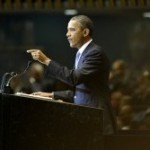The world is preparing to meet again with Iran in an ongoing nuclear dispute, and while United States President Barack Obama wants that process to succeed, he noted that “time is short” to resolve the matter diplomatically. Speaking at Hankuk University in South Korea on Monday, Obama said, “There is time to solve this diplomatically. It is always my preference to solve these issues diplomatically. But time is short.
“Iran’s leaders must understand they, too, face a choice. Iran must act with the seriousness and sense of urgency that this moment demands.”
Obama, according to a transcript of his comments posted on the White House website, said regarding upcoming international talks between Iran and the so-called P5+1, “Once again, there is the possibility of a diplomatic resolution that gives Iran access to peaceful nuclear energy while addressing the concerns of the international community.”
The P5+1—the US, the UK, France, Russia, China and Germany—have essentially served as the world’s negotiators with Iran over Tehran’s nuclear program. The United Nations nuclear watchdog, the International Atomic Energy Agency (IAEA), and others are concerned that Iran is working towards developing technology that can be applied towards nuclear weapons. Concerns also exist over Iran’s ongoing nuclear fuel enrichment program.
Obama met with the leaders of China and Russia on Monday as well, with Iran expected to be a point of discussion in both meetings. The US and Europe have traditionally taken a tougher stance on Iran, while China and Russia—both trading partners with Tehran—have been more reluctant to tighten sanctions.
Following his meeting with Russian President Dmitry Medvedev, Obama said, “We agree that the P5-plus-1 talks with Iran that should be announced soon offer us an opportunity to resolve diplomatically the critical issue of ensuring that Iran is abiding by its international obligations, that will allow it to rejoin the community of nations, and have peaceful uses of nuclear energy while not developing nuclear weapons.”
The P5+1 last met with Iran over one year ago in talks that ultimately collapsed. Multiple sessions between the sides in the last few years have yet to achieve a needed breakthrough on a confidence-building measure from Iran to buy more time for broader nuclear negotiations.
Obama noted in his earlier comments at Hankuk University that the world has offered to help Iran develop peaceful nuclear energy, as allowed by the nuclear Non-Proliferation Treaty (NPT). “Time and again Iran has refused, instead taking the path of denial, deceit and deception,” said Obama. “And that is why Iran also stands alone, as the only member of the NPT unable to convince the international community that its nuclear program is for peaceful purposes.”
A number of economic sanctions have been applied to Iran, including European ones on the Iranian oil industry set to take effect this summer. In addition, rhetoric regarding a possible Israeli or American military strike on Iran’s nuclear facilities has increased in recent months.
However, Obama has repeatedly emphasized that time remains for diplomacy and sanctions to work—a similar track taken on North Korea’s nuclear program. He has also highlighted, however, that a nuclear-armed Iran is not acceptable.
“For the global response to Iran and North Korea’s intransigence, a new international norm is emerging: Treaties are binding; rules will be enforced; and violations will have consequences,” said Obama.
“We refuse to consign ourselves to a future where more and more regimes possess the world’s most deadly weapons.”
(By Staff, www.themideastupdate.com, March 26, 2012)

